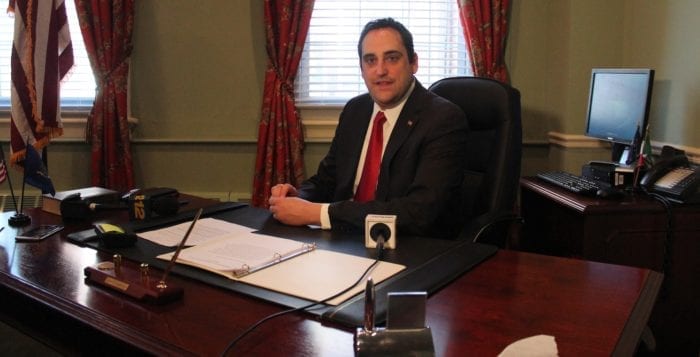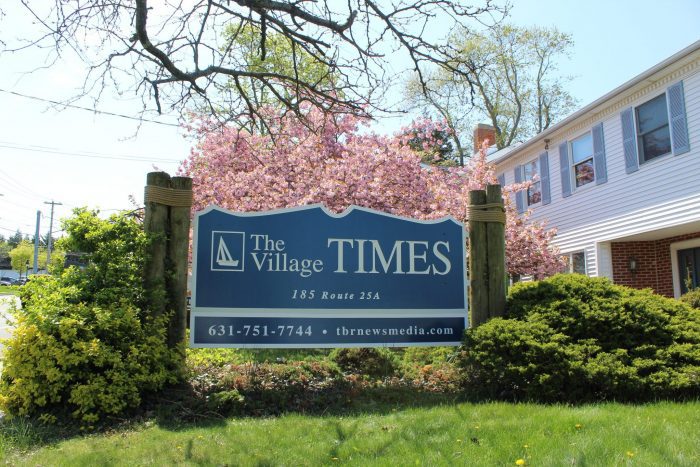Thursday February 1
Unsung Heroes program
Comsewogue Public Library, 170 Terryville Road, Port Jefferson Station kicks off Black History month with a program titled Unsung Heroes: Segregated Military Units from 7 to 8 p.m. Learn about history of the African American units that bravely served their country in the face of discrimination. Open to all. Call 631-928-1212 or visit www.cplib.org to register.
An Evening of Jazz
The Jazz Loft, 275 Christian Ave., Stony Brook presents a concert featuring The Jazz Loft Big Band, a 7-piece big band directed by Jazz Loft Director Tom Manuel, at 7 p.m. Tickets are $30 adults, $25 seniors, $20 students, $15 children and children under 5 years old are free. To order tickets, visit www.thejazzloft.org.
Friday February 2
Groundhog Day Celebration
Six more weeks of winter or an early spring? The Town of Brookhaven will host its annual Groundhog Day Celebration at the Holtsville Ecology Center, 249 Buckley Road, Holtsville starting at 7 a.m. Come meet Holtsville Hal and find out what his shadow foretells. Following the ceremony, residents are welcome to enjoy complimentary hot chocolate, coffee and bagels provided by 7-Eleven and Bagel Lovers and visit the more than 100 non-releasable, wild or injured animals residing at the Animal Preserve, which will be open at 7 a.m. Free. 631-451-5330.
Black History Night
Town of Brookhaven will host the 33rd Annual Black History Night at the Brookhaven Town Hall auditorium, 1 Independence Hill Farmingville at 6 p.m. The evening’s program with the theme African Americans and the Arts will include performances, art exhibits, a cultural food tasting and the presentation of Academic Achievement Awards to Brookhaven’s top 51 African American high school seniors from 10 school districts who achieved a cumulative grade point average of 3.5 or higher. All are welcome. 631-451-TOWN
Cat Jones in Concert
The Village of Port Jefferson Dept. of Recreation and the Greater Port Jefferson Arts Council kick off the 2024 Winter Tide concert series at the Port Jefferson Village Center, 101 E. Broadway, Port Jefferson with a performance by Cat Jones in the Sail Loft Room (3rd floor) from 7 to 8 p.m. The Rhode Island native brings old-school country flavored folk tunes, a perfect way to warm up a winter evening. Tickets are $5 at the door. 631-802-2160
Sound Symphony concert
The Sound Symphony Orchestra with guest conductor Alex Wen will be performing its annual Family Concert at Comsewogue’s John F. Kennedy Middle School, 200 Jayne Blvd., Port Jefferson Station at 7 p.m. Repertoire includes: Mozart’s The Magic Flute; Bernstein’s Overture to “Candide”; Peter Gynt’s Suite No. 1; Mission Impossible Theme; and Saint-Saens’ Danse Bacchanale from Samson and Delilah. Admission is $20 adults, $15 seniors, $10 students, children under 12 free. Snow date is Feb. 4 at 2 p.m. www.soundsymphony.org
Saturday February 3
Casino Night Fundraiser
East Farmingdale Volunteer Fire Department Station 2, 930 Conklin St., Farmingdale will host a Casino Night Fundraiser from 6 to 10 p.m. Tickets are $65 in advance, $80 at the door and include a $250 casino chip value, hors d’oeuvres, wine, beer, soda, door prizes and Chinese auction. Event is limited to 100 tickets. 631-249-0474 ext. 2307
Octávio Deluchi in concert
All Souls Church, 61 Main Street, Stony Brook continues its Saturdays at Six concert series with SBU doctoral student and Brazilian guitarist Octávio Deluchi at 6 p.m. The program will feature a balance between well established and canonical pieces, with new works, with works recently premiered and composed. Selections will include works by Geraldo Vespar, Vicente Paschoal, Laura Snowdon, Dilermando Reis, Augustin Barrios, Marco Pereira and Astor Piazzolla. Free. 631-655-7798
PJFD Steak Night Fundraiser
Port Jefferson Fire Department, 115 Maple Place, Port Jefferson will hold their annual Steak Night fundraiser from 7 to 10 p.m. $50 per person includes a salad bar, T-bone steak, baked potato, dessert, open bar and 50/50 raffle. To RSVP, call 631-291-8195.
Dinner Theater Fundraiser
Polish American Independent Ladies of Port Jefferson will present a Dinner Theater titled Cooking with Germs, 4 Comedies and Such by Ed Eriksson at the Polish American Independent Club, 36 Jayne Blvd., Port Jefferson Station at 7 p.m. $50 per person includes a buffet, wine, beer and soft drinks. To order, visit Moonbeam.Booktix.com. For more information, call 631-793-9870.
An Evening with Drum Tao
Japan’s No.1 sensation, Drum Tao, heads to Stony Brook University’s Staller Center for the Arts’ Main Stage, 100 Nicolls Road, Stony Brook at 7 p.m. for its 30th anniversary tour. Featuring the best in drumming, martial arts, and so much more. Tickets range from $41 to $60. To order, call 631-632-2787 or visit www.stallercenter.com.
Sunday February 4
Caumsett Hike
Caumsett State Historic Park Preserve, 25 Lloyd Harbor Road, Huntington hosts Just a Hike (On the Roads) from 11 a.m. to 1 p.m. This 4-mile, on road moderately paced walk affords walkers the opportunity to relax, socialize, and enjoy the park’s beauty. Adults only. $4 per person. Advance reservations required by calling 631-423-1770.
Port Jefferson Ice Festival
Rescheduled from Jan. 28. Port Jefferson Business Improvement District (BID) in partnership with the Greater Port Jefferson Chamber of Commerce presents the 5th annual Port Jefferson Ice Festival today from noon to 5 p.m. Enjoy ice sculptures throughout the village along with live music, dance performances, ice skating demos, live ice carvings by Rich Daly, character photo opportunities, horse-drawn wagon rides and more. 631-473-1414
Narwhal Ball
The Whaling Museum, 301 Main St. Cold Spring Harbor hosts its annual Narwhal Ball from 11 a.m. to 4 p.m. The whole family is invited to a wintry celebration! Explore the world of polar sea creatures through special activities and presentations. Gather around for “Storytime with Elsa” as she shares tales from her icy domain and meet the icy queen herself to snap a photo. Indulge in an icy treat with ice cream sponsored by Kilwin’s of Huntington. Create frosty crafts to take home with you. Tickets online (through Feb. 2) are $20 age 2-17 (all access) $8 adults, $6 seniors at www.cshwhalingmuseum.org; Door tickets are $25 ages 2-17 (all access) $8 adults, $6 seniors. 631-367-3418.
Anastasia René in concert
Join the North Shore Public Library, 250 Route 25A, Shoreham for a 20’s Jazz concert at 1:30 p.m. Join Anastasia René and her band as they take you back to the world of speakeasies, dancing, clubs, music (both early Blues and Jazz), with renditions of the jazz songs performed by artists such as Bessie Smith, Duke Ellington, Louis Armstrong and more. Open to all. To register, call 631-929-4488.
Frank Latorre in concert
The Long Island Music and Entertainment Hall of Fame, 97 Main St., Stony Brook will host a concert by Frank Latorre and the King Bees from 3 to 4 p.m. The event is free with general admission ticket purchase. For more information, call 631-689-5888 or visit www.limusichalloffame.org.
Monday February 5
DIY Winter Tote
Comsewogue Public Library, 170 Terryville Road, Port Jefferson Station will host a DIY Winter Tote program from 4 to 5 p.m. and again from 7 to 8 p.m. Personalize a tote bag for the season using a variety of stencils with Theresa Maritato. Cost is $5 for materials. Open to all. Registration is required by calling 631-928-1212 or visiting www.cplib.org.
Three Village Civic Meeting
Three Village Civic Association will hold its monthly meeting at the Setauket Fire Department Main Building 190 Main St., Setauket at 7:30 p.m. Guest speaker will be Brookhaven Town Councilmember Jonathan Kornreich. Open to the public. Refreshments will be served. www.3vcivic.org
Portrait of Aretha
CeCe Teneal returns to the John W. Engeman Theater, 250 Main St., Northport for a Portrait of Aretha concert at 8 p.m. to honor the legacy of the Queen of Soul with personalized interpretations of both popular and lesser-known songs from this 18-Grammy-Award-winning icon’s 50-year career, including “Chain of Fools,” “(You Make Me Feel Like) A Natural Woman,” “Rock Steady” and more. Tickets are $45. To order, call 631-261-2900 or visit www.engemantheater.com.
Tuesday February 6
Comedy Night at the Engeman
Join the John W. Engeman Theater, 250 Main St., Northport for an evening of comedy at 8 p.m. Come have some laughs, enjoy some cocktails, and listen to some very funny comedians! Tickets are $45. To order, call 631-261-2900 or visit www.engemantheater.com.
Wednesday February 7
Vanderbilt lecture
Suffolk County Vanderbilt Museum, 180 Little Neck Road, Centerport continues its lecture series with Living Pictures: Gilded Age Portrait Photography at 7 p.m. Erin Pauwels, an author and historian of American art and visual culture, will explore portraiture and identity formation, celebrity culture, and intersections between theater and the visual arts and examine the vibrant history of Sarony, a celebrity photographer once known as “the father of artistic photography in America.” Tickets are $10, members free at www.vanderbiltmuseum.org.
Thursday February 8
Crafts & Cocktails
Join the Whaling Museum, 301 Main St., Cold Spring Harbor for Crafts & Cocktails: Watercolor Wonders from 6:30 to 8 p.m. Explore the science of water through the world’s oldest kind of painting — watercolor! Discover how both sailors and painters learned to exploit the unique properties of water for their own purposes. Harness the power of physics to engineer a colorful layered cocktail to enjoy while you experiment with a variety of fundamental watercolor techniques. Create a nautical watercolor painting to take home. Adults 21+. Tickets are $30 per participant, $20 museum members at www.cshwhalingmuseum.org. 631-367-3418
Reboli Art History Lecture
The Reboli Center for Art and History, 64 Main St., Stony Brook will host a free art history lecture with award-winning artist and art historian aficionado Kevin McEvoy from 6:30 to 8 p.m. Light snacks will be served. No reservations are required to attend. 631-751-7707
Staller Center Music Recital
Jennifer Frautschi and Christina Dahl of SBU Dept. of Music return for another popular evening of duos for violin and piano at Stony Brook University’s Staller Center for the Arts Recital Hall, 100 Nicolls Road, Stony Brook at 7 p.m. This program considers four very different sonatas written within a twenty-year period that encompasses WWI, and the aftermath of the war. Program includes Szymanowski Sonata in D Minor, Op. 9 for Violin and Piano (1904); Bartok Sonata No. 2 for Violin and Piano, SZ 76 (1922); Marguerite Canal Sonata for Violin and Piano (1922)—selections; and Ravel Violin Sonata No. 2 (1923-27). Free. 631-632-2787
Victorian Valentine’s Day
Join the Northport Historical Society, 215 Main St., Northport for a Victorian Valentine’s Day at 7 p.m. Make your date night, Gal-entine’s, or early Valentine’s Day celebration unforgettable! Education Coordinator Carol Taylor takes you on a journey from the beginning of Valentine’s Day to modern times while learning (and sampling) wine paired with handcrafted chocolates. Your evening concludes with a gift provided by Nite Owl Promotions. Tickets are $60, $50 members and must be purchased in advance at www.northporthistorical.org. Ages 21+ only. Questions? Call 631-757-9859.
Film
‘Network’
Cinema Arts Centre, 423 Park Ave., Huntington presents a screening of Network on Feb. 1 at 7:30 p.m. Sidney Lumet’s stinging rebuke of network television stars Peter Finch as Howard Beale, a veteran anchorman who is being forced out of his post after 25 years. At the end of his rope, he announces on air that he will kill himself during his farewell broadcast. Beale’s rants lead to a spike in ratings, opening the door for ambitious producer Diana Christensen (Faye Dunaway) to develop even more outrageous programming. Hosted by Wallace Matthews former columnist for Newsday, the New York Post and ESPN. Tickets are $16, $10 members in advance at www.cinemaartscentre.org or at the door. 631-423-7610
Sky Room Talk at the CAC
The Cinema Arts Centre, 423 Park Ave., Huntington continues its Sky Room Talk series with Hidden Hitchcock Gems on Feb. 5 at 8 p.m. If another filmmaker made any of Alfred Hitchcock lesser known films, they would be heralded as a cinematic master. Hitchcock’s most popular films cause some to bypass his most classic like Young and Innocent, Saboteur, Torn Curtain and many others. Film historian Glenn Andreiev returns to the Cinema with a look at 12 entertaining but over-shadowed Alfred Hitchcock gems. Tickets are $18, $12 members in advance at www.cinemaartscentre.org or at the door. 631-423-7610
‘The Adventures of Robin Hood’
As part of its Best of the Big Screen series, the Cinema Arts Centre, 423 Park Ave., Huntington will screen The Adventures of Robin Hood (1938) starring Errol Flynn and Olivia De Havilland on Feb. 6 at 7:30 p.m. With introduction by Philip Harwood. Ticket are $16, $10 members in advance at www.cinemaartscentre.org or at the door. 631-423-7610
Theater
‘The Gin Game’
Theatre Three, 412 Main Street, Port Jefferson presents D.L. Colburn’s The Gin Game from Jan. 13 to Feb. 3. A fierce battle of wits and wills is revealed as a mismatched pair in a retirement facility inadvertently reveal their hearts as they show their hands in increasingly combative rounds of gin rummy. Poignant, powerful, and heartbreakingly honest, The Gin Game shows that secrets held close to the vest are not safe from being put on the table. The production stars Theatre Three veterans Bradlee and Marci Bing. Tickets are $40 adults, $32 seniors and students. To order, call 631-928-9100 or visit www.theatrethree.com.
‘I Love You, You’re Perfect …’
John W. Engeman Theater, 250 Main St. Northport presents I Love You, You’re Perfect, Now Change, a witty musical revue that tackles modern love in all its forms: from the perils and pitfalls of the first date to marriage, children, and the twilight years of life, from Jan. 18 to March 3. Set in the modern world and told in a series of vignettes and songs, I Love You, You’re Perfect, Now Change traces the overall arc of relationships throughout the course of a life. To order tickets, call 631-261-2900 or visit www.engemantheater.com.
‘(Mostly) True Things’
The Performing Arts Studio, 224 East Main Street, Port Jefferson presents a production of (Mostly) True Things on Feb. 17 at 7 p.m. with stories on the theme Sucker For Love about those times we go to extremes, abandon reason and take big leaps because of love. Four storytellers will compete to win the audience’s choice for the biggest “sucker for love.” Also 3 of the stories will include subtle little lies, but all the stories are otherwise true. The audience gets to question the storytellers, then vote for the person they think told it straight. Tickets are $20 online at eventbrite.com, $25 at the door (cash only). 631-928-6529
Farmers Markets
Huntington Farmers Market
Spirit of Huntington Art Center, 2 Melville Road North, Huntington Station hosts the Long Island Winter Farmers Market every Sunday from 9 a.m. to 1 p.m. through March. 631-470-9620
Port Jefferson Farmers Market
The Port Jefferson Winter Farmers Market returns to the Port Jefferson Village Center, 101 E. Broadway, Port Jefferson on Sundays from 10 a.m. to 2 p.m. through April 28. 631-802-2160
Class Reunions
•Centereach High School Class of 1974 will hold its 50th reunion at the Meadow Club, 1147 Route 112, Port Jefferson Station on April 26 from 6 to 10 p.m. For more information, email Jean Ann Renzulli at [email protected].
•Port Jefferson High School Class of 1964 will hold its 60th reunion at the Meadow Club, 1147 Route 112, Port Jefferson Station on Oct. 17. For more information, email Mike Whelen at [email protected].
















